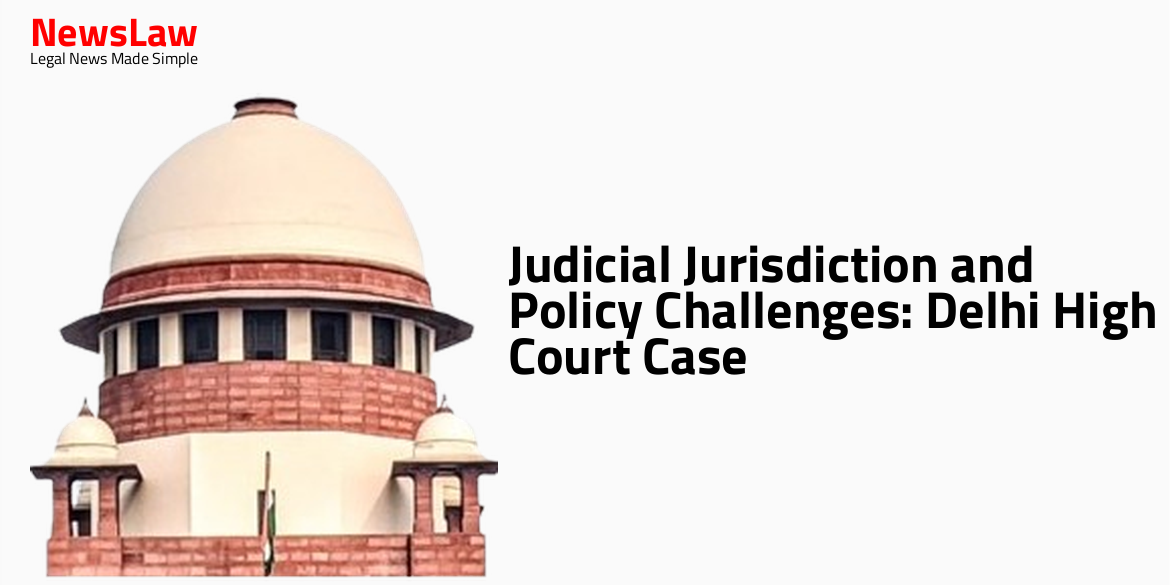In a recent legal case, the court delves into the complex interplay between the MSMED Act, 2006 and the Arbitration Act, 1996, focusing on questions of jurisdiction and statutory interpretation. The court’s in-depth analysis sheds light on the overriding effect of special statutes, like the MSMED Act, 2006, over general laws, and examines the principles of legal hierarchy and beneficial statutes. Stay tuned to unravel the intricate legal considerations at play in this significant case.
Facts
- The High Court dismissed the writ petitions filed by the appellants, stating that challenges against orders passed by the Arbitral tribunal must be in accordance with the provisions of the Arbitration Act, 1996.
- The High Court emphasized that the MSMED Act, 2006 takes precedence over any other law or instrument, as per Section 24.
- The Facilitation Council cannot decide to initiate arbitration proceedings under Section 18(3) of the MSMED Act, 2006, if it has already conducted conciliation proceedings.
- Krunal Works invoked Section 18(1) of the MSMED Act, 2006 by approaching the Facilitation Council.
- GSPL raised objections regarding the Facilitation Council’s jurisdiction due to the existence of an arbitration agreement between the parties.
- Despite an independent arbitration agreement, the Facilitation Council had the jurisdiction to entertain the reference made under the MSMED Act, 2006.
- The Facilitation Council, Thane, being the respondent, conducted conciliation proceedings but could not take up disputes for arbitration due to Section 80 of the Arbitration Act, 1996.
- GSPL challenged order before Bombay High Court, recommending Act for non-payment of dues to small-scale industries.
- Original supplier approached Facilitation Council for recovery of dues against appellants.
- Appellants filed writ petitions in Delhi High Court against the said order.
- Appellant’s preliminary objection rejected by Facilitation Council in 2014.
- Arbitrator appointed by appellant directed parties to appear for preliminary hearing.
- Respondent no. 2 filed application before Facilitation Council invoking provisions of MSMED Act.
- Proceedings before Facilitation Council governed by Arbitration Act, 1996.
- Respondent Steel Authority filed writ petition to restrain Council from entertaining the reference.
- Expert committee on small enterprises constituted in 1995.
- Appellants raised objection on maintainability of reference due to arbitration clause.
- Dispute referred to Micro and Small Enterprises Facilitation Council instead of arbitration.
- Small and Medium Enterprises Development Bill introduced in 2005.
- Respondent Steel Authority objected to Facilitation Council’s jurisdiction due to existing arbitration agreement.
- Appellant invoked arbitration clause for dispute settlement.
- M/s Vidarbha Ceramics raised objection to arbitration, preferring the matter be referred to Justice C.P. Sen or MSMED Facilitation Council.
- Appellant and respondent entered into an agreement for Annual Maintenance Contract.
- Appellant challenged order by filing writ petition before Gujarat High Court.
- Division Bench dismissed L.P.A. filed by appellant.
- Appellant appointed another retired Supreme Court Judge as Sole Arbitrator.
- Disputes between appellant and respondent referred to Gujarat Chambers of Commerce and Industry by Facilitation Council.
- Conciliation process failed, disputes referred to Delhi International Arbitration Centre by Facilitation Council.
- Appeal filed by aggrieved appellant before the Court.
- Union of India filed appeal against High Court’s judgment and order.
- Facilitation Council passed award in favor of IBEX after appellants filed reply on merits.
- Supplier M/s Vidarbha Ceramics filed reference before Facilitation Council.
Also Read: Balancing Power and Transparency: Electoral Bonds Struck Down, Disclosure Mandated
Issue
- Common questions of law arising in cases involving the MSMED Act, 2006 and the Arbitration Act, 1996.
- Whether provisions of the MSMED Act, 2006 override those of the Arbitration Act, 1996.
- Whether a party can be precluded from referring a dispute under the MSMED Act, 2006, if an independent arbitration agreement exists.
- Whether the Micro and Small Enterprises Facilitation Council can act as an arbitrator after conducting conciliation proceedings.
Also Read: Recall of Resolution Plan Approval: Legal Analysis
Arguments
- The learned counsel for the appellant raised issues regarding the overriding effect of the MSMED Act, 2006 over the Arbitration Act, 1996.
- Challenges were also made regarding the jurisdiction of Facilitation Council and the parties’ autonomy to enter into agreements concerning statutory provisions.
- The concept of causus omissus was also brought up during the submissions.
Analysis
- Section 18 of the MSMED Act, 2006 gives parties the right to adjudicate disputes through the Facilitation Council, overriding any contractual provisions for dispute resolution.
- The MSMED Act, 2006 overrides the Arbitration Act, 1996 as it is a special legislation protecting MSMEs.
- Section 24 of the MSMED Act, 2006 states that its provisions have an effect overriding any inconsistent laws.
- The Facilitation Council has the authority under Section 18(3) of the MSMED Act, 2006 to take up disputes for arbitration after failed conciliation.
- The Facilitation Council acting as an Arbitral Tribunal has the power to rule on its own jurisdiction as per Section 16 of the Arbitration Act, 1996.
- Section 7 of the Arbitration Act defines an arbitration agreement as an agreement by parties to submit certain disputes to arbitration.
- Section 2(1)(b) defines ‘arbitration agreement’ to mean an agreement as referred to in Section 7.
- Section 8(1) empowers the judicial authority to refer parties to arbitration if there is an arbitration agreement, unless no valid arbitration agreement exists.
- Chapter-IV deals with the jurisdiction of arbitral tribunals, with Section 16 stating the competence of the arbitral tribunal to rule on its jurisdiction.
- Section 21 specifies the commencement of arbitral proceedings, while Section 42 determines the jurisdiction of courts over arbitral proceedings.
- Section 43 addresses Limitations, applying the Limitation Act, 1963 to arbitrations.
- Chapter-V of the MSMED Act focuses on delayed payments to micro and small enterprises, establishing liability for buyers, interest rates, and the establishment of facilitation councils for dispute resolutions.
- The Act aims to enhance the competitiveness of micro, small, and medium enterprises through various provisions.
- The precedence of the provisions in Chapter V of the MSMED Act, 2006 over the Arbitration Act, 1996 is being questioned in the appeals.
- Special statutes are said to take precedence over general statutes based on various court decisions.
- The MSMED Act, 2006 is considered a special statute that should prevail over the Arbitration Act, 1996.
- Sections 15 to 19 of the MSMED Act, 2006 are interlinked and seen to override independently entered arbitration agreements.
- Section 18 of the MSMED Act, 2006 is viewed as substantive law providing rights for dispute resolution.
- Beneficial or welfare statutes like the MSMED Act, 2006 should be given a liberal interpretation for the benefit of the parties involved.
- Legal fictions and principles of statutory interpretation play a role in establishing the hierarchy of laws in conflict.
- The concept of election and the doctrine of approbate and reprobate are mentioned in the context of statutory interpretation.
- The High Court’s decision regarding the jurisdiction of the Facilitation Council in relation to the MSMED Act, 2006 is under scrutiny.
- Special laws, like the MSMED Act, 2006, are defined as laws enacted for special cases and circumstances contrary to general laws.
- No infirmity found in the impugned order passed by the High Court
Decision
- The appeal stands allowed accordingly.
- The present appeal arises from the judgment dated 21.08.2010 passed by the Division Bench of Bombay High Court, Nagpur Bench.
- The appeal stands dismissed accordingly.
- This appeal (Civil Appeal No 127 of 2018) was filed by the Maharashtra State Electricity Distribution Company challenging the order dated 27.06.2017 passed by the High Court of Judicature at Bombay, Nagpur Bench in Writ Petition No 4435 of 2011.
- The issue in this appeal involves the jurisdiction of the respondent- Facilitation Council to decide the original application filed by M/s. Ramkrishna Electricals Ltd. under Section 18(1) of the MSMED Act.
- The Single Bench, by its order dated 09.09.2019, dismissed the writ petition.
- The appeal stands allowed accordingly.
- The arbitration proceedings before the Facilitation Council shall continue as per the Arbitration Act, 1996.
- The Appeal stands disposed of accordingly.
Case Title: GUJARAT STATE CIVIL SUPPLIES CORPORATION LTD. Vs. MAHAKALI FOODS PVT. LTD. (UNIT 2) (2022 INSC 1140)
Case Number: C.A. No.-008008-008008 / 2022



